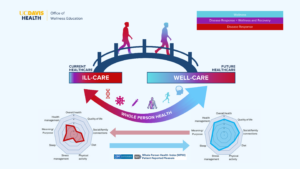How can health care systems transition from ill-care to well-care?
Scott Fishman, MD is a professor in the UC Davis School of Medicine, the Executive Director of the Office of Wellness Education, and the Jacquelyn S. Anderson Endowed Chair in Wellness.
Modern health care often functions as a “disease response system,” says Dr. Fishman, providing care in reaction to a disease rather than working to prevent that disease from taking hold in the first place. He defines this current system of healthcare as “ill-care.”
Alternatively, “well-care” describes a system that is prepared to support patient longevity alongside treating illness.
To move toward a system that emphasizes well-care, health systems must be willing to move beyond only disease treatment and invest in prevention, resilience, and well-being. This requires educational training for clinicians to address the full scope of patient needs.

Dr. Fishman describes the transition from the current ill-care system to the future well-care system using a bridge. As we work to cross this bridge and support wellness as an essential part of healthcare, additional elements support this transition as pictured in the above bridge graphic. These elements include whole-person health and the Whole Person Health Index, created by the National Center for Complementary and Integrative Health (NCCIH) at the National Institutes for Health (NIH).
As OWE and our partners continue to work toward this transition from ill-care to well-care, Dr. Fishman says, “our hope is that we will evolve as health systems to really address people within their whole selves, their whole lives and the worlds that they live in.”
For more from Dr. Fishman on this topic, read his op-ed in The Hill.